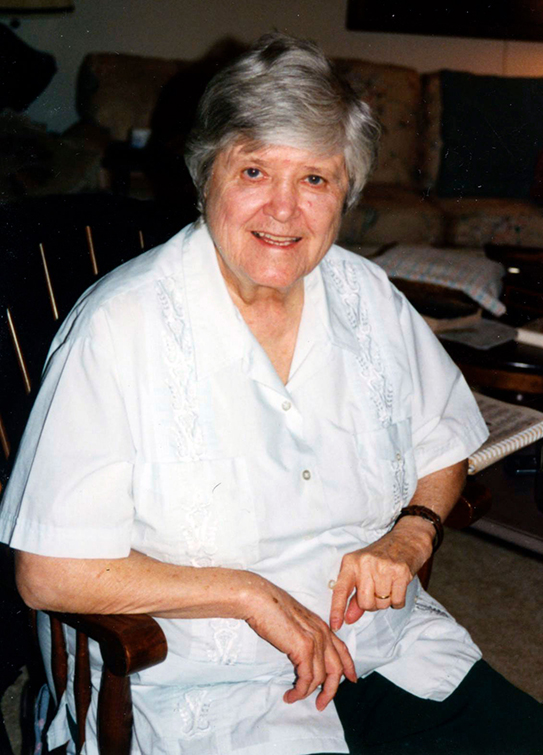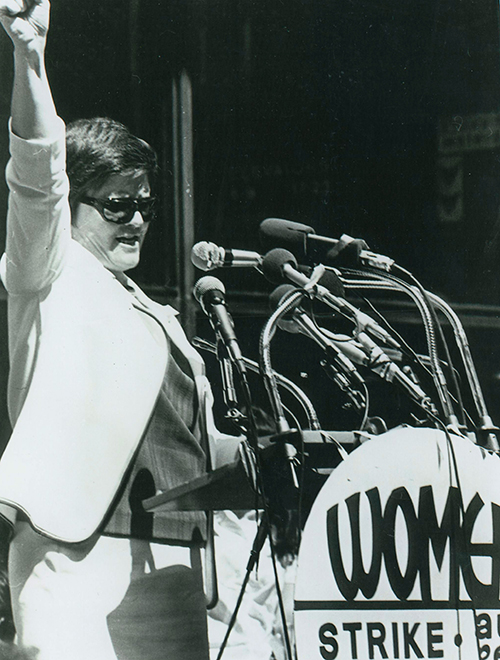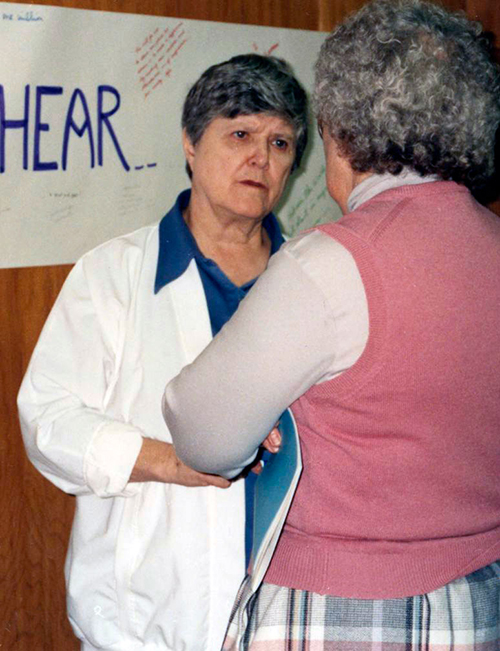 Sister Margaret Ellen Traxler learned from an early age to care for all people, regardless of race, ethnic background, gender or socioeconomic status from the examples her parents provided. Her father and mother, a simple country doctor and a nurse living in Henderson, Minnesota, provided care to others day or night, regardless of a person’s ability to pay. The compassion and care her parents expressed impacted Sister Margaret Ellen deeply, and remained a very strong influence throughout her life. In her biography, Sister Margaret Ellen stated, “Our challenge is to love people we serve and to have them feel this love. If they do not feel our love, I believe that our love is flawed.”
Sister Margaret Ellen Traxler learned from an early age to care for all people, regardless of race, ethnic background, gender or socioeconomic status from the examples her parents provided. Her father and mother, a simple country doctor and a nurse living in Henderson, Minnesota, provided care to others day or night, regardless of a person’s ability to pay. The compassion and care her parents expressed impacted Sister Margaret Ellen deeply, and remained a very strong influence throughout her life. In her biography, Sister Margaret Ellen stated, “Our challenge is to love people we serve and to have them feel this love. If they do not feel our love, I believe that our love is flawed.”
Sister Margaret Ellen attended Good Counsel Academy in Mankato, Minnesota, where she debated new ideas, played the trumpet and challenged herself physically and mentally. She grew to admire the sisters who taught her and decided to become a School Sister of Notre Dame after graduation. She entered the congregation in August 1941, and professed first vows in July 1945. She earned a bachelor’s degree in English from the College of St. Catherine in St. Paul, Minnesota, and a master’s degree from Notre Dame University in South Bend, Indiana.
Sister Margaret Ellen spent the next 20 years teaching high school English in Minnesota and North Dakota. At times her ministry was challenging, especially when she was confronted with the bigoted attitudes of some of her students. Despite these challenges, she maintained a positive outlook. Sister Margaret Ellen stated in her autobiography, “I haven’t been disappointed. You see, one can be disappointed if you make up your mind to be. But I made up my mind, no, I will not be. I figured early on I was going to have an attitude that was positive.”
 Sister Margaret Ellen’s positive attitude helped her recognize that social change was direly needed. In March 1965, she participated with many women and men religious in the marches from Selma to Montgomery, Alabama. Led by Dr. Martin Luther King, Jr., the marchers demanded an end to voter discrimination based on race. As a result, President Lyndon Johnson signed the Voting Rights Act of 1965, which protects and enforces the 14th and 15th Amendments. The Selma marches, along with other major social upheavals in 1960s America, and the mandates brought forth by Vatican II, also changed how women religious got involved with social justice issues. Previously, women religious worked quietly in the background to evoke change. Starting in the mid-60s, many women religious felt they not only needed to work directly with the poor and disenfranchised, but also to demonstrate, speak out and take a political stance against policies and attitudes that went against Gospel teaching. After the Selma marches, Sister Margaret Ellen wrote an article for Extensions magazine, calling out to women religious, “After Selma, sister, you can’t stay home again!”
Sister Margaret Ellen’s positive attitude helped her recognize that social change was direly needed. In March 1965, she participated with many women and men religious in the marches from Selma to Montgomery, Alabama. Led by Dr. Martin Luther King, Jr., the marchers demanded an end to voter discrimination based on race. As a result, President Lyndon Johnson signed the Voting Rights Act of 1965, which protects and enforces the 14th and 15th Amendments. The Selma marches, along with other major social upheavals in 1960s America, and the mandates brought forth by Vatican II, also changed how women religious got involved with social justice issues. Previously, women religious worked quietly in the background to evoke change. Starting in the mid-60s, many women religious felt they not only needed to work directly with the poor and disenfranchised, but also to demonstrate, speak out and take a political stance against policies and attitudes that went against Gospel teaching. After the Selma marches, Sister Margaret Ellen wrote an article for Extensions magazine, calling out to women religious, “After Selma, sister, you can’t stay home again!”
Sister Margaret Ellen definitely did not stay home. Shortly before she participated in the Selma marches, she became the director of the Department of Educational Services for the National Catholic Conference for Interracial Justice (NCCIJ) in Chicago. She served the NCCIJ for 10 years, three of these years as the organization’s executive director, founding and directing many projects and programs revolving around interracial relations and social justice. Some of the programs and projects included:
- Traveling workshops. Traveling throughout the U.S. and Canada, sisters provided information about interracial relations to help schools prepare for racial integration.
- Choice. Over 400 sisters with Ph.Ds. taught at African-American colleges for one year so that African-American teachers, whose places the sisters took, could finish Ph.D. programs.
- Student Urban Education. Sisters taught teachers the importance and implementation methods of inter-ethnic education.
- Project Bridge.Helped narrow the gap between racial and ethnic groups in Cleveland, Ohio.
From racial equality and integration, Sister Margaret Ellen expanded her focus to help draw attention to issues affecting women. In 1969, she co-founded the National Coalition of American Nuns (NCAN) to advocate for women to be fully represented in the Catholic Church and for women religious to have full control over their communities. Through NCAN, Sister Margaret Ellen continued to speak out against the Catholic Church’s treatment of women, even picketing at the Vatican in 1975.
Sister Margaret Ellen was also sympathetic to the plight of those in Jewish communities located throughout the world. In 1968, while serving as a member of the American delegation to the General Chapter of the School Sisters of Notre Dame in Munich, she initiated a visit to Dachau. The trip affected her profoundly. In her biography, Sister Margaret Ellen remarked that Russian Jews had been “victims of centuries of pogroms and now again in our day, being persecuted and denied exit visas.” She founded the National Interreligious Task Force on Soviet Jewry in 1972, and helped more than 263,000 Soviet Jews immigrate to countries of their choice. Because of her work toward educating Christians about Jewish heritage, Sister Margaret Ellen was awarded a State of Israel medal by Prime Minister Golda Meir.
 In 1974, Sister Margaret Ellen formed teams of women – lawyers, judges, social workers, psychologists – who taught female prisoners about their legal rights. She called this group the Institute for Women Today, and for 15 years Sister Margaret Ellen and members of this group visited prisons across the Midwest and the South, teaching women inmates job skills and advocating for better conditions. In some cases, the Institute was able to obtain the release of women whose civil rights had been violated.
In 1974, Sister Margaret Ellen formed teams of women – lawyers, judges, social workers, psychologists – who taught female prisoners about their legal rights. She called this group the Institute for Women Today, and for 15 years Sister Margaret Ellen and members of this group visited prisons across the Midwest and the South, teaching women inmates job skills and advocating for better conditions. In some cases, the Institute was able to obtain the release of women whose civil rights had been violated.
Until her death in 2002, Sister Margaret Ellen continued to be a champion for racial and gender equality and to fight for the rights of the poor and downtrodden. In her later years, she established Mary’s Pence, a nonprofit dedicated to funding projects that supported women’s well-being. She also founded three shelters in Chicago: Sister House, an interim house for women leaving prison; Maria Shelter, a place for abused women and their children; and Casa Notre Dame, a home for older, homeless women. She was also a featured presenter at many national and international conferences and workshops, where she encouraged others to strive for peace, fairness and equality.
In the March 9, 2002, online issue of the Minneapolis Star Tribune, Sister Donna Quinn, a member of the Sinsinawa Dominicans and a close friend of Sister Margaret Ellen, stated, “She called us to do more, to know that people were suffering and hurting. I think that’s the call of a prophet – to reach out and say these are my people and to spend your life, which she did, bringing them out of their slavery – whatever it might be – and freeing them and letting them know they could empower themselves. That’s what a prophet does.”
Like Sister Margaret Ellen Traxler and other sisters who have come before, the School Sisters of Notre Dame (SSND) continue to defend the rights of those who are not treated fairly and equally and help to improve the lives of the poor and vulnerable. SSNDs do this by actively promoting diversity and inclusivity. An example is at Mount Mary University in Milwaukee, an SSND supported ministry. Learn more about Mount Mary’s efforts to encourage diversity and inclusivity among its student body, faculty and staff.
For additional historical information or research please contact:
School Sisters of Notre Dame North American Archives
Mount Mary University, Bergstrom Hall, Rm. 86
2900 North Menomonee River Parkway
Milwaukee, WI 53222
Phone: 1-414-763-1000
Email: archives@ssnd.org
Link: https://ssnd.org/archives